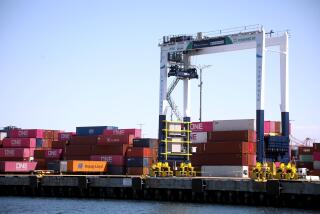Bush May Rev Up State Fuel Research
- Share via
President Bush’s plan to spend $1.2 billion to further hydrogen-fuel research probably would help speed up development of fuel-cell vehicles and provide California businesses with increased opportunities to profit from the new technologies, industry experts say.
Although automotive fuel-cell development has been in the works for at least the last five years, the president’s proposal to more than double federal funding for hydrogen-fuel research is seen as critical to increasing momentum. Without a nationwide system to supply the necessary hydrogen fuel, fuel-cell cars would merely sit in dealer showrooms.
California already is a vital player in this research, largely because of the state’s strict emissions standards.
A test network of hydrogen-fueling stations is being developed to enable researchers to drive experimental vehicles from Sacramento and Davis, Calif., south to Los Angeles and Orange counties. Each of the areas is home to a fuel-cell research program, including those privately funded by the U.S. arms of automakers Honda Motor Co. and Toyota Motor Corp., which are based in Torrance.
If Congress approves the new fuel research funding, which Bush pitched in his State of the Union address Tuesday, more cash is expected to flow from the Energy Department to programs at UC Davis and UC Irvine and to agencies such as the California Air Resources Board, which regulates air quality.
The president’s support of hydrogen fuel and fuel cells “validates a lot of what we are doing here” said resources board Chairman Alan Lloyd.
The Energy Department and CARB are members of the California Fuel Cell Partnership, a private industry-government venture in Sacramento that also includes most major automakers, several big oil companies and fuel-cell development firms.
“The fuel cell is a global project, but California is ground zero with regards as to how it works for cars,” said partnership spokesman Joe Irvin. “The local benefit is that we get to see and experience development first and we will benefit as the first users of these vehicles,” he said, noting that this could create manufacturing and other business opportunities.
Already, Irvin said, a number of small companies have located in California for the fuel-cell future. Among them are Enova Systems Inc., an alternative power systems integrator in Torrance, and Quantum Fuel Systems Technologies Worldwide Inc., an Irvine-based firm that develops pressurized storage containers for hydrogen and other alternative fuels.
Other private firms in the state are involved in developing various critical pieces of the so-called freedom-fuel infrastructure. The term refers to development of a hydrogen-fuel system as a way of reducing America’s dependence on imported oil.
Hydrogen can be burned in place of gasoline in internal-combustion engines -- both Ford Motor Co. and Germany’s BMW are testing hydrogen-combustion engines. (BMW has its test facility in Oxnard.)
Most of the work, though, is being done on hydrogen as the fuel for fuel-cell vehicles -- cars and trucks that use an on-board electro-chemical reaction to convert hydrogen gas and water into electricity, which is used to power an electric drive motor.
Fuel-cell cars, when pure hydrogen is the only power source, are zero-emission vehicles. The only byproduct of the conversion process is a trickle of distilled water.






